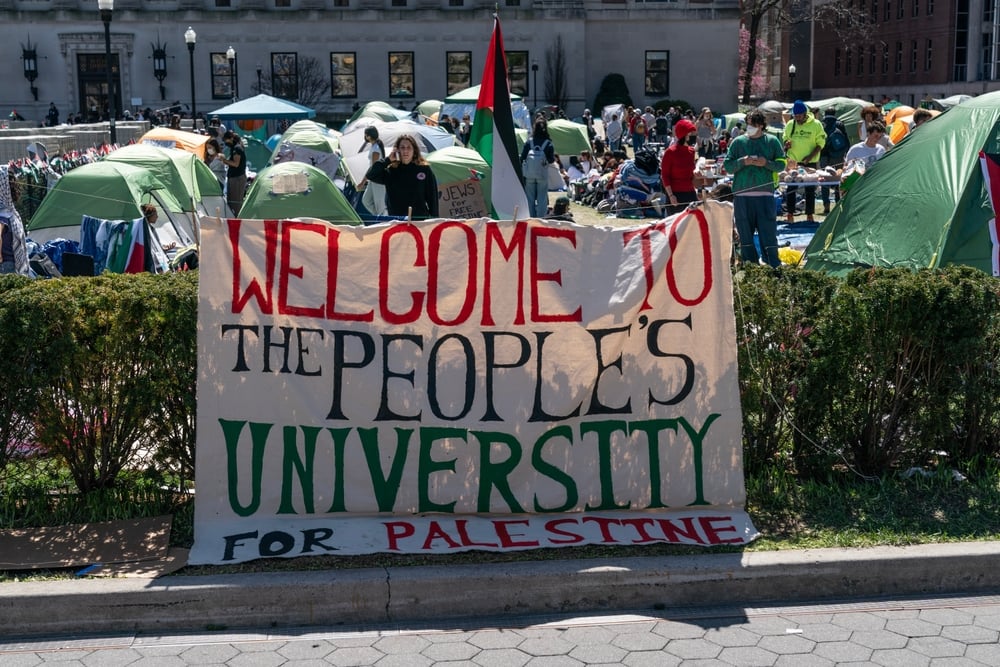Many of the 30 to 40 mainly Jewish and Israeli students currently enrolled in the program involving Tel Aviv University are increasingly nervous about spending two of their four years on Columbia’s campus.
By Vered Weiss, World Israel News
A partnership launched four years ago between Columbia University and Tel Aviv University which offers students a chance to spend half of their undergraduate years in Israel and half in New York will not be shut down, despite vocal anti-Israel protesters calling on Columbia’s administration to shutter the program.
However, program organizers in Tel Aviv and New York have acknowledged that the vocal anti-Israel protests and increasing antisemitism are troubling to American Jewish and Israeli students alike.
Prof. Milette Shamir, VP International of Tel Aviv University, who oversees and helped create the program, told The Times of Israel, “I won’t pretend this doesn’t have ramifications for us… It’s a very fragile and nervous application market this year for international schools.”
As the relatively new program will see its first graduating class this year, Columbia has announced that a formal, public graduation ceremony will be canceled due to the chaos on campus.
Many of the 30 to 40 mainly Jewish and Israeli students currently enrolled in the program are increasingly nervous about spending two of their four years on the New York campus, with the other two years spent in Tel Aviv.
“Our students who are there now (in New York), some of them are fearful, or not at ease. Many of them are shaken,” Shamir admitted.
Those who have already been accepted to the dual-degree program may consider whether they feel safe enrolling at all.
A number of students are braving the menacing atmosphere and are determined not to yield their ground to antisemitic protesters.
However, the students also acknowledge what they are up against, as Inbar Brand, a student enrolled in the program, explained.
“The protest groups on campus are specifically targeting Israeli students and the dual-degree students at the same level,” she said.
“Jewish students feel lots of pressure, but it varies depending on their levels of association with Israel and sensitivity to the anti-Zionist rhetoric on campus,” she added.
Ezra Horton, 21, who isn’t scheduled to participate in the Columbia section of the program until next year, describes watching the protests about Israel from Israel.
“Even as a student in Tel Aviv we are feeling the impact,” he said. “The protests there are concerning and contribute to a general sense of not feeling safe as a Jew, particularly as a person on this program.”
One of the things that really stuck out were the calls for intifada. I feel that is a call for war… it’s a direct call for violence on all my friends in Israel. How am I going to go and sit in a class with people who are calling for [my] death… it’s scary.”
However, Horton expressed his determination to study in New York anyway when the time comes.
“I need to go anyway… I need to be stronger than what is going on there,” Horton said.
However, the program is accommodating students who, due to the current situation, prefer to finish the remainder of the program in Tel Aviv rather than Columbia.
Issy Lyons, 21, a first-year student, said, “It’s one of the main conversations we are having as students right now: Is it our job to go there and to fight and be a part, or to stay in Tel Aviv? Everyone is very concerned,” she said.
“There is one student who came back to Tel Aviv, saying Columbia was too much for him, too much antisemitism around campus,” Lyons added. “A lot of the students there have to defend themselves every day. It really affects them.”


